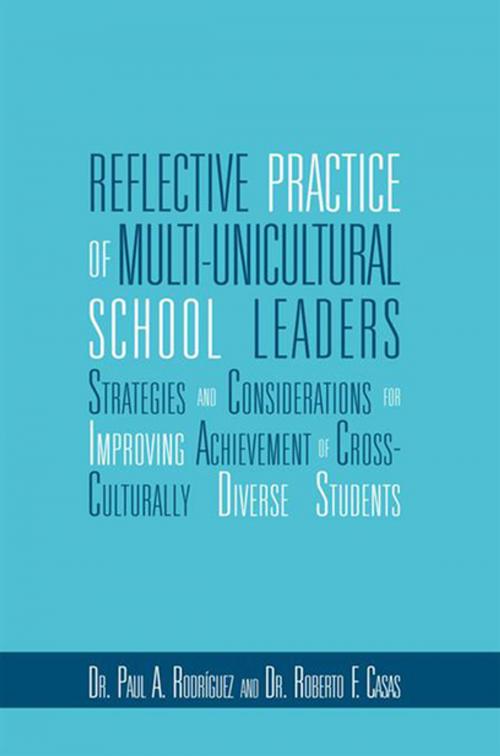| Author: | Dr. Roberto F. Casas, Dr. Paul A. Rodríguez | ISBN: | 9781469162966 |
| Publisher: | Xlibris US | Publication: | February 21, 2012 |
| Imprint: | Xlibris US | Language: | English |
| Author: | Dr. Roberto F. Casas, Dr. Paul A. Rodríguez |
| ISBN: | 9781469162966 |
| Publisher: | Xlibris US |
| Publication: | February 21, 2012 |
| Imprint: | Xlibris US |
| Language: | English |
We have written this book because of our unique and real concern for improving education for children who are at risk of school failure. Whether these students are of different ethnicities or speak different languages, the students are not failures, but have difficulty maneuvering in a system we call school. In order to improve education, we have to improve schools and the practices of school leaders. This transformation of schools requires change and improvement of individuals in school leadership positions. In order to change school leaders and their practices toward improvement, we must replicate what is working for kids through reflective practice. Osterman and Kottkamp (1993) offered this perspective: We believe that reflective practice, an approach to educational improvement that is both situational and places the professional in the very center of the attempt to create improvement not only stands in contrast to most other current ideas but has the greatest potential of any approach improving individuals and, through them, schools and education. (p. vii) The book was written because we share professional practices and intellectual interests in reflection and reflective practice. We are passionate that reflection has the best hope and significant change in how leaders examine their personal beliefs, values, and behaviors in such a way that members of the school community realize that it is they who must adapt their practices to meet the needs of students at risk and the diverse communities they serve. However, before we discuss the importance of reflective practice, we need to arrive at a definition of reflective practice. Schon (1983) defines reflective practice as the capacity to reflect on action so as to engage in a process of continuous learning. Similarly, Bolton (2010) stated that reflective practice involves playing critical attention to practical values and theories which inform everyday action, by examining practice reflectively and reflexively. This leads to developmental insight. Another idea by Boud et al. (1985) states, Reflection is an important human activity in which people recapture their experience, think about it, mull it over and evaluate it. It is this working with experience that is important in learning. As for education, Larrivee (2000) argues, Reflective practice refers to the process of the educator studying his or her own teaching methods and determining what works best for students. It involves the consideration of the ethical consequences of classroom procedures on students.
We have written this book because of our unique and real concern for improving education for children who are at risk of school failure. Whether these students are of different ethnicities or speak different languages, the students are not failures, but have difficulty maneuvering in a system we call school. In order to improve education, we have to improve schools and the practices of school leaders. This transformation of schools requires change and improvement of individuals in school leadership positions. In order to change school leaders and their practices toward improvement, we must replicate what is working for kids through reflective practice. Osterman and Kottkamp (1993) offered this perspective: We believe that reflective practice, an approach to educational improvement that is both situational and places the professional in the very center of the attempt to create improvement not only stands in contrast to most other current ideas but has the greatest potential of any approach improving individuals and, through them, schools and education. (p. vii) The book was written because we share professional practices and intellectual interests in reflection and reflective practice. We are passionate that reflection has the best hope and significant change in how leaders examine their personal beliefs, values, and behaviors in such a way that members of the school community realize that it is they who must adapt their practices to meet the needs of students at risk and the diverse communities they serve. However, before we discuss the importance of reflective practice, we need to arrive at a definition of reflective practice. Schon (1983) defines reflective practice as the capacity to reflect on action so as to engage in a process of continuous learning. Similarly, Bolton (2010) stated that reflective practice involves playing critical attention to practical values and theories which inform everyday action, by examining practice reflectively and reflexively. This leads to developmental insight. Another idea by Boud et al. (1985) states, Reflection is an important human activity in which people recapture their experience, think about it, mull it over and evaluate it. It is this working with experience that is important in learning. As for education, Larrivee (2000) argues, Reflective practice refers to the process of the educator studying his or her own teaching methods and determining what works best for students. It involves the consideration of the ethical consequences of classroom procedures on students.















